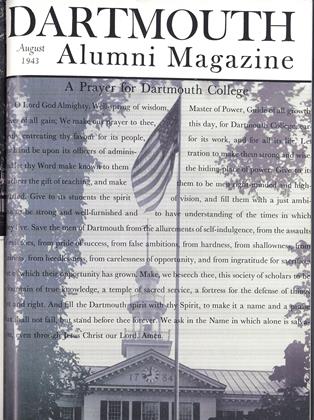Several letters of rather passionate protest appear elsewhere in this issue against the idea, suggested in this department a few weeks ago, that Mr. Roosevelt's cherished plan to insure everybody against want from the cradle to the grave might not be an unmixed blessing. The present writer is still convinced that the plan has its serious defects, the chief of which is that such an insurance might easily tend toward the atrophy of the nation's moral fibre; and he is heartened in this belief by the recent advocacy of a fifth freedom by Fulton Lewis Jr., the well known radio commentator, on much the same general grounds. The fifth freedom, as thus suggested, seems to be freedom for private enterprise, or freedom to make the most of one's own life by one's own efforts, untrammeled by governmental leading-strings.
Those who adopt the doctrine that the natural inequalities in human society should be atoned for by bigger and better hand-outs from Washington, and who react vehemently against the idea that there is a virtue in the spur of individual necessity which this country would be worse with- out, seem shocked to find that any one should be so callous as to take a different view. However, many do take it and are quite sincere in doing so. Very possibly there is a safe middle ground between the excessively hard-boiled doctrine and the insufferably mushy, but it is not too easy to find it, or keep to it when found. The present writer's feeling is, as before, that the idea of insuring every man, woman and child in the land against want, "from the womb to the tomb," goes much farther than it is expedient to go, and that so far from proving a blessing it might all too easily turn out to be a curse. It is doubtful that this country would have amounted to so much if insurance against want had been enjoyed by all its citizens from 1789 to 1943. It might more probably have become a sissy and a push-over for ruder nations with a sterner creed. The danger is still with us, and presumably always will be.
It is not a new doctrine that the uses o£ adversity are not entirely sour. The more novel theory is that adversity is so completely bad as to warrant an attempt to eradicate it by government artifice from the world. Admittedly, any spur is a cruel thing; but at least it gets results and results are what the country must have if there is to be progress rather than a comfortable stagnation. Insurance against want from the cradle to the grave has certainly not been the American way up to now; and the point under discussion is whether or not the time is ripe to make it the American way by resort to a New Order.
The one really vulnerable point assailed by dissenting correspondents is that, in discussing this question, reference was made to the fourth freedom—freedom from fear —as if it were bound up with the third, which is freedom from want. But it is not merely freedom from want that threatens harm; it is freedom from the fear of want that may lead to harmful relaxation, and that is as surely involved in the fourth freedom as is freedom from the dread of rival armaments. One is more likely to strive to keep himself afloat by vigorous swimming if not sustained by governmental waterwings: That way danger lies, in a national softness which might be fatal.
THE HANOVER SCENE ON JULY 1 AS 2000 V-12 TRAINEES LINED UP TO REGISTER
 View Full Issue
View Full Issue
More From This Issue
-
 Article
ArticleDARTMOUTH WAR DIRECTORY
August 1943 -
 Lettter from the Editor
Lettter from the Editor'Round the Girdled Earth
August 1943 -
 Article
ArticleOpportunity for Improvability
August 1943 -
 Class Notes
Class Notes1934
August 1943 By JOHN W. KNIBBS III -
 Class Notes
Class Notes1918
August 1943 By ERNEST H. EARLEY -
 Class Notes
Class Notes1937
August 1943 By JOHN H. DEVLIN JR.
Article
-
 Article
ArticleIt is hardly to be conceived that a magazine devoted primarily
November, 1922 -
 Article
ArticleMasthead
June 1936 -
 Article
ArticleHow to balance bike or budget
November 1942 -
 Article
ArticleThe Dartmouth Alumni Council's
MARCH 1970 -
 Article
ArticleTHE HANOVER SCENE
FEBRUARY 1959 By BILL MCCARTER '19 -
 Article
ArticleThayer School
December 1950 By WILLIAM P. KIMBALL '29

